 MyDogBreeds
MyDogBreeds Staffordshire Bull Terrier is originated from United Kingdom but Mackenzie River Husky is originated from United States. Staffordshire Bull Terrier may grow 33 cm / 12 inches shorter than Mackenzie River Husky. Staffordshire Bull Terrier may weigh 30 kg / 66 pounds lesser than Mackenzie River Husky. Both Staffordshire Bull Terrier and Mackenzie River Husky has almost same life span. Staffordshire Bull Terrier may have less litter size than Mackenzie River Husky. Staffordshire Bull Terrier requires Low maintenance. But Mackenzie River Husky requires Moderate maintenance
Staffordshire Bull Terrier is originated from United Kingdom but Mackenzie River Husky is originated from United States. Staffordshire Bull Terrier may grow 33 cm / 12 inches shorter than Mackenzie River Husky. Staffordshire Bull Terrier may weigh 30 kg / 66 pounds lesser than Mackenzie River Husky. Both Staffordshire Bull Terrier and Mackenzie River Husky has almost same life span. Staffordshire Bull Terrier may have less litter size than Mackenzie River Husky. Staffordshire Bull Terrier requires Low maintenance. But Mackenzie River Husky requires Moderate maintenance
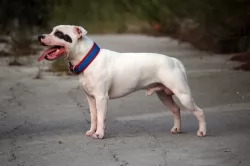 The Staffordshire Bull Terrier was first developed in the northern sections of Birmingham and in Staffordshire, England. The Staffie is a cross between a Black and Tan Terrie and the Bulldog, but had other breeds crossed in over time in order to create a bull-baiting dog and a fighting dog. In the Victorian age these sports were banned but dog fighting went underground and continues on some level today.
The Staffordshire Bull Terrier was first developed in the northern sections of Birmingham and in Staffordshire, England. The Staffie is a cross between a Black and Tan Terrie and the Bulldog, but had other breeds crossed in over time in order to create a bull-baiting dog and a fighting dog. In the Victorian age these sports were banned but dog fighting went underground and continues on some level today.
The Staffordshire Bull Terrier was exceptional at these “sports” due to his build, power and jaw strength. Today’s Staffie is a descendent of those early Bull Terrier crosses. Together with the Bull Terrier and the American Pit Bull, the Staffie also traces its roots back to those original English Bully dogs. All three breeds have the Bulldog in common.
After dog fighting and bull baiting were banned the Stafforshire Bull Terrier was further developed as a companion and pet. Still their reputation as fighting dogs cost them recognition in the official kennel clubs for some time. They finally made the UK registry in 1935, but it was not until 1974 that the American Kennel Club (AKC) accepted them.
 The name Mackenzie River Husky was given to these huskies by those wanting to name the freight huskies of a certain area. The name took hold in the 1960’s, but the dog began to disappear with the introduction of snow machines.
The name Mackenzie River Husky was given to these huskies by those wanting to name the freight huskies of a certain area. The name took hold in the 1960’s, but the dog began to disappear with the introduction of snow machines.
They’re a mixture of native sled dogs - Newfoundlands, St. Bernards, Staghounds and Wolf. As a mixed breed, they have always been regarded as classic sled dogs.
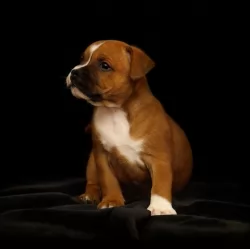 The Staffordshire is a muscular, stocky and unusually strong breed, small to medium size in height and build. They have broad, powerful chests, wide set, strong legs, strong shoulders, broad head with a fairly short muzzle. Their ears are not cropped but they are short and fold over. The coat is stiff, close and short and the tail is medium and carried low. Most Staffies are brown, but they can be red, brindle with white, fawn, black, white or blue.
The Staffordshire is a muscular, stocky and unusually strong breed, small to medium size in height and build. They have broad, powerful chests, wide set, strong legs, strong shoulders, broad head with a fairly short muzzle. Their ears are not cropped but they are short and fold over. The coat is stiff, close and short and the tail is medium and carried low. Most Staffies are brown, but they can be red, brindle with white, fawn, black, white or blue.
 The beautiful Mackenzie River Husky stands at 66 to 74cm in height and weighs between 29 and 47kg.
The beautiful Mackenzie River Husky stands at 66 to 74cm in height and weighs between 29 and 47kg.
This deep chested dog has a long, straight coat with the colors being typically wolf-like – white, cream, black, tan, blonde and red. He has erect ears, long legs and a long, bushy tail.
This wolf-type dog is strong willed and independent and was always a pack dog. They wouldn’t be described as a good choice for the first time dog owner as they do seem to have some wolf traits and will require a strong, firm, level headed owner.
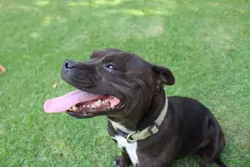 1.Children friendliness The breed adores children but care should still be taken because they are so strong and their jaws are so powerful.
1.Children friendliness The breed adores children but care should still be taken because they are so strong and their jaws are so powerful.
2.Special talents they adore children and they one of the most powerful jaws among canines.
 Your MacKenzie River Husky is such a likeable pet to have. True, he does tend to be a bit stubborn and independent but there is nothing that training and socialization won’t do for him. You’ll find him much more obedient and amicable, and he gets on well with children and pets in the home.
Your MacKenzie River Husky is such a likeable pet to have. True, he does tend to be a bit stubborn and independent but there is nothing that training and socialization won’t do for him. You’ll find him much more obedient and amicable, and he gets on well with children and pets in the home.
He is an intelligent dog too and very energetic so will require an owner who is active, firm and consistent. He thrives on human company and just wants to be around his owner all the time, ready to join in with any activity happening in his life.
He is therefore far more suited to life in the countryside than to the city. Loyal, devoted and loving, a MacKenzie River Husky isn’t only a beautiful dog to own, he promises to offer everything you want in a 4-legged friend.
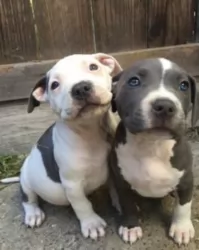 • Patella luxation otherwise known as a slipped kneecap- can cause pain and some lameness.
• Patella luxation otherwise known as a slipped kneecap- can cause pain and some lameness.
• Skin allergies and even a tendency toward Mange which is chronic in some forms and fatal in others.
• Like most active dogs their size, they are susceptible to bloat which can be fatal if not treated immediately.
 Your MacKenzie River Husky, regardless of how healthy he is, can suffer with some common health problems that all dogs are prone to.
Your MacKenzie River Husky, regardless of how healthy he is, can suffer with some common health problems that all dogs are prone to.
Perhaps one of the more common health problems that this particular dog breed has to contend with is cataracts, hip dyslasia and hypothyroidism.
Many people associate cataracts in dogs with age, little realizing that there are many medical reasons as to why our pets develop cataracts. Cataracts can start as early as 6 months of age, although this is unlikely. They come about because of a disease which affects the lens of the eye, causing the lens to lose its transparency.
You’ll notice a whitish/grey shade in your dog’s eye and this can actually impair vision. Cataracts are particularly the lot of diabetic dogs. It can certainly help to have your dog’s eyes checked by a vet regularly.
This is another fairly common problem with Huskies. It’s almost like a death sentence if your MacKenzie is a working dog because it can lead to lameness. The disease can lead to problems in the hip joint which cab be debilitating ad give your dog a lot of pain.
It doesn’t strike old dogs only, but can be the lot of young dogs too. Sometimes treatment will require surgery but there are non-invasive options too. You want to make sure that you don’t allow your pet to become overweight as this can contribute to developing hip dysplasia.
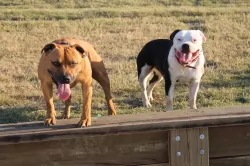 1.Feeding the puppy Don’t over feed as he grows fast. Feed a high quality dog food for medium size puppies. Feed 1-2 and a quarter cups in 3-4 meals per day.
1.Feeding the puppy Don’t over feed as he grows fast. Feed a high quality dog food for medium size puppies. Feed 1-2 and a quarter cups in 3-4 meals per day.
2.Feeding the adult Don’t exercise right before or after eating due to potential for bloat. Feed 1-2 times a day a high quality medium breed dog food.
4. Games and Exercises They are terriers after all and they dig. Need a fairly large yard with a strong fence. They love to play ball, frisbee and can excel at cart pulling.
 Huskies like this one will require a good deal of exercise every single day. These are working dogs who have always had a job to do and you can certainly count him in when you do your hiking walks, swimming – you name it. The only thing he will object to is that he doesn’t do well in hot weather. Strong-willed, you’ll want your MacKenzie River Husky trained and socialized if you want him to be a companionable dog.
Huskies like this one will require a good deal of exercise every single day. These are working dogs who have always had a job to do and you can certainly count him in when you do your hiking walks, swimming – you name it. The only thing he will object to is that he doesn’t do well in hot weather. Strong-willed, you’ll want your MacKenzie River Husky trained and socialized if you want him to be a companionable dog.
Dogs need to be fed according to the size, their age and their lifestyle. If your MacKenzie River Husky is an active working dog, his food must be the very best and contain enough calories to cover the daily caloric expenses.
Quality and the amount of vitamins and minerals in the food is most important for a dog like this. If you feed him commercially manufactured food, make sure its high quality and not made up of fillers, and other bad stuff. Read the label and understand exactly what’s going into your dog’s stomach.
Simplicity with feeding is best for your pet. Treat him occasionally to cooked chicken, brown rice, pasta and cooked or raw vegetables which can be added into his dry kibble. A dog like this will require some raw meat as well to ensure his coat and eyes are always shiny and bright.
Grooming of the MacKenzie River Husky must be done at least twice a week to get rid of loose hairs.